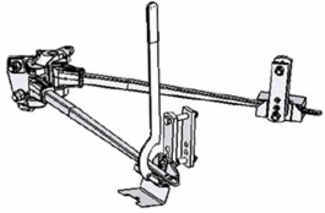gatorbait4sure
Well-Known Member
First of all I need to tell you all that I am a White Knuckle Driver when hauling the trailer......Now I will tell you why.
I used to ride Dressage Horses...and I mean the BIG WARMBLOODS, 17 plus hands. My trainer lives an hour away, in Provincetown, MA which is surrounded by stunning beaches.
One lovely Summer day a boarder and I decided to load two horses up and drive to P-Town to ride those beaches. Off we go......Until I felt something funny and looked in the rearview to see my trailer swinging madly from side to side! I was good and stayed off the brakes, but was quickly approaching a roundabout on a busy Midcape Highway. Nowhere to go!!! The trailer continued to swing over the center line, and back over the white line on the other side, with traffic following me and coming toward me.
The other person with me yelled for me to step on the accelerator HARD......So I did. Luckily there was space in front of me to do this.....
The swinging stopped and I pulled off onto the grass and sat there trembling. BTW, No one stopped to see if I was OK here either...
I finally got out to check the horses who were standing there eating their hay, no worse the wear......then checked the trailer and hook up....Nothing wrong!
I turned around and went back home, SLOWLY, unloaded, unhooked, and called the trailer folk to find out what happened.
They said anyone hauling with a bumper pull should have SWAY BARS on the trailer which run to the hitch. These are heavy steel bars that keep trailers from swinging from side to side either from weight shifting, wind, or sudden movement of the vehicle. It does involve a larger hitch for the bars to attach to, and they look huge when having to step over them, BUT, my new trailer NEVER moves, and it is an x-tra tall, x-tra wide...and I load it to the gills! I never complain when hooking up, nor when I crack my shinbone on the HUGE hitch....NEVER! And my trailer NEVER moves anywhere but forward and backward now!
Learn from my mistakes, folks!
dru
I used to ride Dressage Horses...and I mean the BIG WARMBLOODS, 17 plus hands. My trainer lives an hour away, in Provincetown, MA which is surrounded by stunning beaches.
One lovely Summer day a boarder and I decided to load two horses up and drive to P-Town to ride those beaches. Off we go......Until I felt something funny and looked in the rearview to see my trailer swinging madly from side to side! I was good and stayed off the brakes, but was quickly approaching a roundabout on a busy Midcape Highway. Nowhere to go!!! The trailer continued to swing over the center line, and back over the white line on the other side, with traffic following me and coming toward me.
The other person with me yelled for me to step on the accelerator HARD......So I did. Luckily there was space in front of me to do this.....
The swinging stopped and I pulled off onto the grass and sat there trembling. BTW, No one stopped to see if I was OK here either...
I finally got out to check the horses who were standing there eating their hay, no worse the wear......then checked the trailer and hook up....Nothing wrong!
I turned around and went back home, SLOWLY, unloaded, unhooked, and called the trailer folk to find out what happened.
They said anyone hauling with a bumper pull should have SWAY BARS on the trailer which run to the hitch. These are heavy steel bars that keep trailers from swinging from side to side either from weight shifting, wind, or sudden movement of the vehicle. It does involve a larger hitch for the bars to attach to, and they look huge when having to step over them, BUT, my new trailer NEVER moves, and it is an x-tra tall, x-tra wide...and I load it to the gills! I never complain when hooking up, nor when I crack my shinbone on the HUGE hitch....NEVER! And my trailer NEVER moves anywhere but forward and backward now!
Learn from my mistakes, folks!
dru





















































